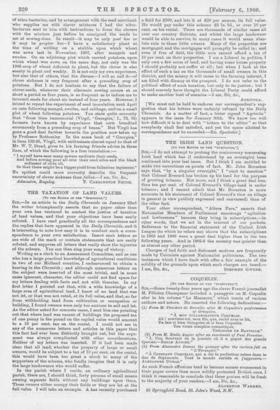THE TAXATION OF LAND VALUES. [To THE EDITOR OW ma"
SPECTATOR.")
SIR,—In an article in the Daily Chronicle on January 22nd the writer triumphantly asserts that no paper other than your own has ventured to contest the justice of taxation of land values, and that your objections have been easily refuted. I have read practically all the correspondence and the replies that have appeared in the Daily Chronicle, and it is interesting to note how easy it is to conduct such a corre- spondence to your own satisfaction. Insert such letters as are wide of the mark or contain statements that are easily refuted, and suppress all letters that really show the injustice of the scheme. You can then sing your song of victory.
Writing as a clerk to an Assessment Committee, and as one who has a huge practical knowledge of agricultural conditions in two of our Midland counties, I endeavoured to obtain a hearing in the Chronicle ; and although numerous letters on the subject were inserted of the most trivial, and in some cases ignorant, character, the editor could not find space for my letters dealing with facts and not with theories. In my first letter I pointed out that, with a wide knowledge of a large area of agricultural land, I knew of no land that was not let, or that was not rated, at its full value, and that, so far from withholding land from cultivation or occupation or building, I found owners were only too anxious to sell and let. As the editor asked for concrete cases, I sent him one pointing out that where land was vacant of buildings the proposed tax of one penny in the pound on the capital value would amount to a 10 per cent, tax on the rental. I could not see in any of the numerous letters and articles in this paper that this fact had ever been distinctly brought out, but the argu- ment was always complicated with other considerations. Neither of my letters was inserted. If it had been made clear that all land, whether the property of large or small owners, would be subject to a tax of 10 per cent, on the rental, this would have been too great a shock to many of the supporters of the scheme, who fondly imagine that it is only the large landowners who would suffer.
In the parish where I reside, an ordinary agricultural parish, there are, I should think, forty persons of small means owning separate fields without any buildings upon them. These owners either occupy their fields or they are let at the full value. I will take an example. A has recently purchased a field for 2500, and lets it at 220 per annum, its full value. He would pay under this scheme 22 is. 8d., or over 10 per cent. on his rental. There are thousands of similar cases all over our country districts, and whilst the large landowner would be able to survive, in many cases it would mean abso- lute ruin to these little owners. Many of the properties are mortgaged, and the mortgages will promptly be called in; and even if free of debt, the little men cannot afford a tax of 10 per cent. on their properties. I am a Liberal in politics, I only own a few acres of land, and having some house property I should probably not suffer at ; but when I look at the effect of such a tax on the thousands of small owners in this district, and the misery it will cause to the farming interest, I am filled with dismay at the prospect. I do not refer to the political effect of such taxation, but only to its justice ; but I should scarcely have thought the Liberal Party could afford to make another host of enemies.—I am, Sir, &c., AGRICOLA.
[We must not be held to endorse our correspondent's sug- gestion that his letters were unfairly refused by the Daily Chronicle. As a matter of fact, a letter signed "Agricola" appears in the issue for January 30th. We know too well how difficult it is to deal with "letters to the editor" so that everybody shall feel satisfied, and yet the space allotted to correspondence not be exceeded.—En. Spectator.]









































 Previous page
Previous page